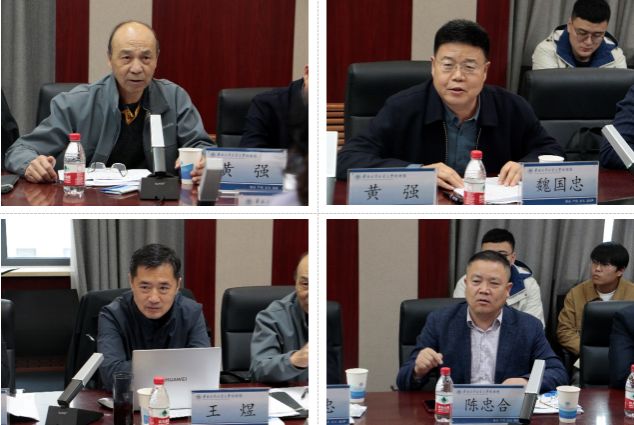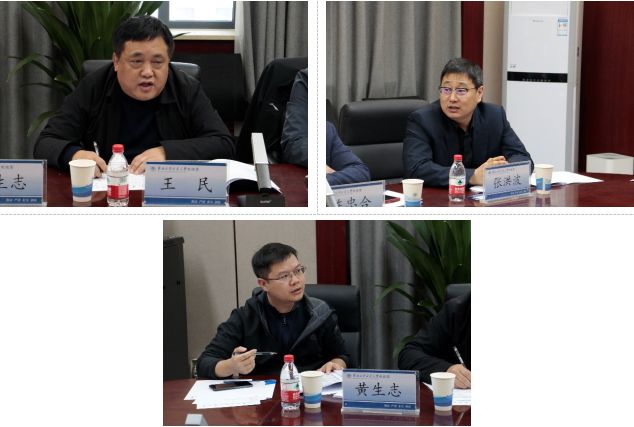Contributed by: Science and Technology Office | Edited by: Liu Ye | Preliminary Review: Wang Wenchuan | Final Review: Liang Lili | Date: March 29, 2024

On March 27, the "14th Five-Year Plan" National Key Research and Development Program Project - "Progressive Dynamic Prediction and Early Warning of Water Supply and Demand Coupled with Water Network Engineering and the Breeding Process of Extreme Drought" (2023YFC3006603) Project Kickoff Meeting and Implementation Plan Demonstration Meeting, chaired by Professor Li Yanbin, Vice President of our university, was held at our university. The meeting was attended by project leader Prof. Lyu Juan from the China Institute of Water Resources and Hydropower Research, Prof. Li Yanbin, consulting experts, Prof. Chen Yuanzhao, Associate Dean of the Office of Science and Technology at our university, Associate Director Qu Yanping from the Institute of Flood Control, Drought Relief, and Disaster Reduction Research of the China Institute of Water Resources and Hydropower Research, as well as more than 20 core members of the project team and research backbone.
Water network engineering is a crucial infrastructure for dealing with super-drought disasters. Under the dual influence of climate change and human activities, the dynamic response mechanism of water resources supply and demand has become increasingly complex. While water supply and demand forecasting and early warning mainly target normal years' water resource allocation, progressive multi-stage forecasting and early warning techniques for the incubation process of super droughts are yet to be developed. This project aims to address key scientific issues related to the dynamic response mechanism of water resources supply and demand under super drought conditions and the key technical issues of progressive multi-stage water supply and demand forecasting and early warning, providing support for emergency allocation and scheduling of water resources and the formulation of drought resistance plans.
Professor Huang Qiang from Xi'an University of Technology, Senior Level II Bureau Rank Official Wei Guozhong from the Hebei Provincial Department of Water Resources, Senior Planner Wang Yu from the Yellow River Conservancy Commission of the Ministry of Water Resources, Senior Vice General Manager Chen Zhonghe from the Henan Branch of the China South-to-North Water Diversion Middle Route Corporation Limited, Senior Chief Engineer Wang Min from the Henan Water & Power Engineering Consulting Co., Ltd., Professor Zhang Hongbo from Chang'an University, and Professor Huang Shengzhi from Xi'an University of Technology were invited. Professor Huang Qiang served as the leader of the expert group for the kickoff meeting and implementation plan demonstration.

Prof. Lyu Juan, as the project leader and director of the Flood Control, Drought Relief, and Disaster Reduction Engineering Technology Research Center of the Ministry of Water Resources, expressed congratulations to the project team and heartfelt thanks to the attending expert leaders. She hoped that under the guidance of the experts, the quality of the project and the feasibility of the implementation plan could be targetedly improved, achieving substantive breakthroughs and progress on key issues. The lead unit, leader, and cooperating units of the project should further clarify their relationships, strengthen communication, interaction, connection, and integration, define their respective responsibilities, promote in-depth research on the project, focus on coordinated drought prevention and control under super drought conditions, develop key technologies, and innovate methods to provide scientific support for national drought resistance and disaster reduction.
Li Yanbin expressed heartfelt thanks to the attending expert leaders, believing that the implementation plan demonstration meeting gathered well-known domestic experts and scholars, providing us with a rare comprehensive learning opportunity, broadening our horizons, and inspiring new ideas. He stated that during the implementation of the project, he would fully absorb the opinions of the expert group, carefully improve the implementation plan, and ensure the completion of the project tasks and assessment indicators with high quality and quantity. As the project leader, Li Yanbin reported on the project implementation plan from aspects such as research background and content, decomposition of project tasks and implementation paths, expected results, and innovative breakthroughs. Each responsible person for the project subtopics also reported on the implementation plans.


During the project inquiry phase, attending experts provided targeted suggestions on the research scope, period, and incremental value of the project. They offered valuable feedback on the scientific nature, rationality, and feasibility of the implementation plan concerning target setting, method selection, planning arrangements, and organizational management. The expert group unanimously agreed that the project had clear research objectives, comprehensive research content, a clear task breakdown with a prominent focus, feasible technical routes, reasonable assessment indicator evaluation methods, orderly work plan arrangements, and standardized and complete organizational management and work systems. These elements are capable of supporting and ensuring the smooth implementation of the project, meeting the requirements of the national key research and development program projects.
